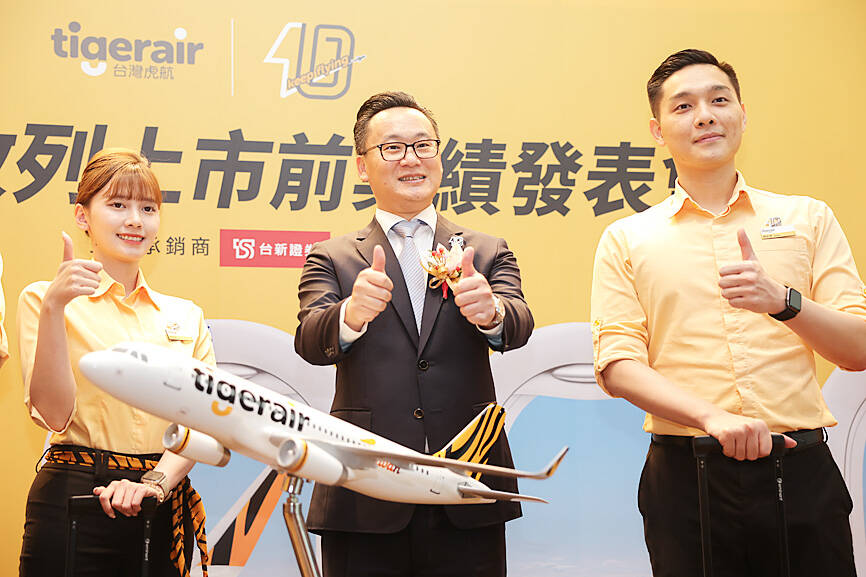Low-cost carrier Tigerair Taiwan Ltd (台灣虎航) yesterday said its operating performance this year would be better than last year’s on the back of an increase in passenger flights and the addition of new routes.
The airline, a subsidiary of China Airlines Ltd (CAL, 中華航空), said that it would strive to distribute dividends to shareholders beginning next year, as it is scheduled to begin trading on the main bourse by the end of this year.
Tigerair’s shares are listed on the Taiwan Stock Exchange’s Taiwan Innovation Board, on which they rose 1.78 percent to NT$68.70 yesterday.

Photo: CNA
“Tigerair Taiwan aims to continue surpassing itself ... and let’s wait and see what’s next,” Tigerair chairman Kevin Chen (陳漢銘) told a news conference in Taipei.
Established in 2014 as a joint venture between Singapore-based Tiger Airways Ltd and CAL before becoming a wholly owned subsidiary of CAL in 2017, Tigerair offers flights to 28 destinations in Asia on 41 routes.
With its fleet of 15 Airbus 320s, the airline has launched 14 new routes amid a global tourism boom in the post-COVID-19 pandemic era, Tigerair said in a statement.
The launch of a new route between Taoyuan and Miyazaki, Japan, on Nov. 26 would mark the airline’s 20th destination in Japan, Tigerair said, adding that it has the most flights to Japan and South Korea among Taiwanese carriers.
Due to the surge in the number of people traveling abroad and the increase in overseas destinations after the pandemic, Tigerair’s cumulative revenue from January to September this year was NT$12.64 billion (US$395.4 million), an annual increase of 39.65 percent and surpassing its revenue of NT$12.47 billion for the whole of last year.
The airline posted net profit of NT$2.48 billion in the first three quarters, the most for the period in its history, or earnings per share of NT$5.52, up from NT$3.17 in the same period last year.
Gross margin and operating margin improved to 32 percent and 26 percent respectively in the first three quarters, the airline said.
With the arrival of maple leaf viewing, skiing, and the Christmas and New Year holidays in Japan and South Korea, the tourism market would remain strong this quarter, Tigerair said.
The airline would continue adding new destinations and routes to serve customers, it said.
International travel demand last year had almost returned to pre-pandemic levels and global passenger demand might grow 3.8 percent this year, the International Air Transport Association said.
The Asia-Pacific region is seen as a key market for further demand growth, the association said.

Real estate agent and property developer JSL Construction & Development Co (愛山林) led the average compensation rankings among companies listed on the Taiwan Stock Exchange (TWSE) last year, while contract chipmaker Taiwan Semiconductor Manufacturing Co (TSMC, 台積電) finished 14th. JSL Construction paid its employees total average compensation of NT$4.78 million (US$159,701), down 13.5 percent from a year earlier, but still ahead of the most profitable listed tech giants, including TSMC, TWSE data showed. Last year, the average compensation (which includes salary, overtime, bonuses and allowances) paid by TSMC rose 21.6 percent to reach about NT$3.33 million, lifting its ranking by 10 notches

Popular vape brands such as Geek Bar might get more expensive in the US — if you can find them at all. Shipments of vapes from China to the US ground to a near halt last month from a year ago, official data showed, hit by US President Donald Trump’s tariffs and a crackdown on unauthorized e-cigarettes in the world’s biggest market for smoking alternatives. That includes Geek Bar, a brand of flavored vapes that is not authorized to sell in the US, but which had been widely available due to porous import controls. One retailer, who asked not to be named, because

SEASONAL WEAKNESS: The combined revenue of the top 10 foundries fell 5.4%, but rush orders and China’s subsidies partially offset slowing demand Taiwan Semiconductor Manufacturing Co (TSMC, 台積電) further solidified its dominance in the global wafer foundry business in the first quarter of this year, remaining far ahead of its closest rival, Samsung Electronics Co, TrendForce Corp (集邦科技) said yesterday. TSMC posted US$25.52 billion in sales in the January-to-March period, down 5 percent from the previous quarter, but its market share rose from 67.1 percent the previous quarter to 67.6 percent, TrendForce said in a report. While smartphone-related wafer shipments declined in the first quarter due to seasonal factors, solid demand for artificial intelligence (AI) and high-performance computing (HPC) devices and urgent TV-related orders

MINERAL DIPLOMACY: The Chinese commerce ministry said it approved applications for the export of rare earths in a move that could help ease US-China trade tensions Chinese Vice Premier He Lifeng (何立峰) is today to meet a US delegation for talks in the UK, Beijing announced on Saturday amid a fragile truce in the trade dispute between the two powers. He is to visit the UK from yesterday to Friday at the invitation of the British government, the Chinese Ministry of Foreign Affairs said in a statement. He and US representatives are to cochair the first meeting of the US-China economic and trade consultation mechanism, it said. US President Donald Trump on Friday announced that a new round of trade talks with China would start in London beginning today,